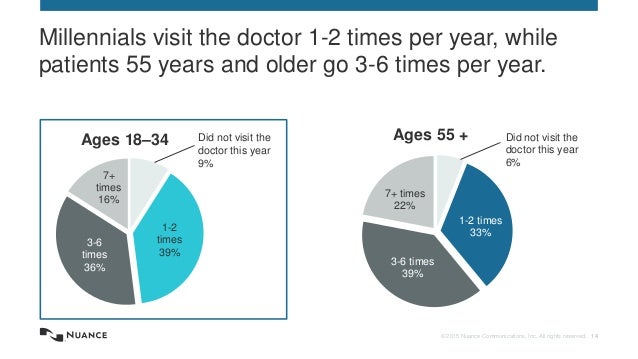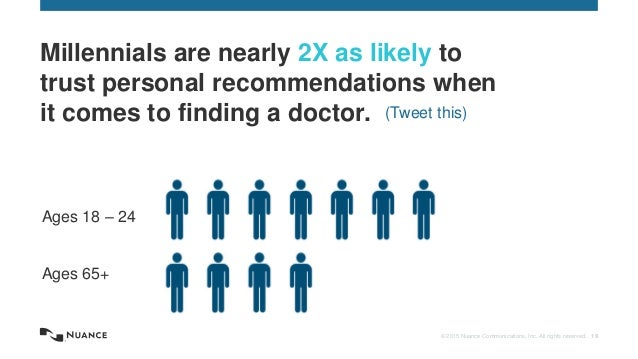
Millennials overtook Baby Boomers this year as the largest living generation; and while Baby Boomers may currently consume most healthcare resources, the move to value-based care and increased focus on prevention is driving healthcare providers to better understand and reach Millennial patients.
As part of its ongoing research on the changing practice of the art of medicine, Nuance Communications, Inc. today released new data on generational patient behaviors and the slideshare presentation, “How Millennials shop for healthcare.” From its global survey of 3,000 people, this latest data highlights how providers will need to shift to simultaneously support Millennials and Baby Boomer patients, who have different expectations and preferences for the delivery of care.
“As patients play a much greater role in determining how, when, and where they receive care, organizations that don’t stay closely connected to their patients won’t be able to survive,” said Trace Devanny, President of the Healthcare Division, Nuance. “Providers need to better understand the populations they serve and the threats to their business to remain competitive in their market and best manage their patients’ needs.”
Here are eight recent trends from the report that illustrates how Millennials shop for healthcare:
Millennials Share Referrals and Negative Healthcare Experiences
1. Millennials visit the doctor 1-2 times per year, while patients 55 years and older go 3-6 times per year. 1-2 times

2. Staying true to their social nature, 70 percent of young Millennials (aged 18 – 24) choose a primary care physician based on recommendations from family and friends, compared to only 41 percent of patients over the age of 65.
3. While the majority (51 percent) of patients 65 and older tell their doctors directly if they are unsatisfied with their care, 60 percent of younger patients tell their friends, instead. This poses a new challenge for providers, who may not hear directly from younger patients when they’re unhappy with their care.
4. Not only do Millennials share negative feedback with friends and family, but those contacts are more likely to trust the feedback and make their own decisions based on what they’ve heard from their personal network.
Millennials Turn to the Web for Healthcare Information

5. 85 percent of Millennials own smartphones today.
6. Millennials were much more likely compared to other age groups to turn to online sources related to healthcare references. More than 54 percent of Millennials said they search online for health information before seeing a physician; whereas the global average for all patient ages is 39 percent.
“When I needed to find a new physician, I looked for a doctor within my insurance network and then turned to online reviews,” said Kay Zimmermann, a 25-year old patient. “Based on the comments, I ruled out several doctors, including one I was originally considering because someone mentioned they felt rushed and treated like a paycheck during their appointment.”
7. For the vast majority of Millennials, it’s commonplace to use the Internet and their social networks to read reviews on products, movies, restaurants – and using the web to shop for providers is a natural extension. Like consumer brands, which have had to adjust to using social networks and interacting with consumers through new channels, providers will need to become more focused on what’s being said about them online, and will need to place a higher priority on online scorecards.
“We know a huge number of patients today are looking up symptoms and health information online, so it’s just a matter of time until they shop for physicians and communicate grievances that way, too,” said Tony Oliva, MD, national medical director, Nuance Communications. “These are informed healthcare consumers who, if they feel rushed, are likely to share criticism online. Healthcare organizations need to find ways to help physicians optimize time spent with their patients and to protect their reputations.”
8. Only 36% of Millennials use online reviews to find a doctor, however more than 50% use their smartphones to research products and read user reviews while shopping.
